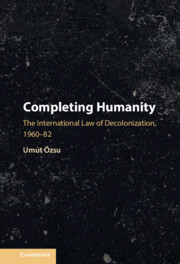Book contents
- Completing Humanity
- Completing Humanity
- Copyright page
- Dedication
- Epigraph
- Contents
- Acknowledgements
- Note on Terminology and Translations
- Table of Cases
- Table of Treaties and Other Instruments
- Table of Resolutions
- Table of Domestic Statutes
- Abbreviations
- Introduction
- 1 Fixing Selves
- 2 Forging Universals
- 3 Redistributing Resources
- 4 Pooling Rights
- 5 Righting Markets
- Conclusion
- Bibliography
- Index
5 - Righting Markets
Published online by Cambridge University Press: 16 January 2024
- Completing Humanity
- Completing Humanity
- Copyright page
- Dedication
- Epigraph
- Contents
- Acknowledgements
- Note on Terminology and Translations
- Table of Cases
- Table of Treaties and Other Instruments
- Table of Resolutions
- Table of Domestic Statutes
- Abbreviations
- Introduction
- 1 Fixing Selves
- 2 Forging Universals
- 3 Redistributing Resources
- 4 Pooling Rights
- 5 Righting Markets
- Conclusion
- Bibliography
- Index
Summary
This chapter focuses on the debates about development, human rights, and ‘basic needs’ that defined much of the push to craft a decolonized international law during the late 1970s and early 1980s. In particular, it considers the emergence of the international right to development, and the relation between international human rights and poverty-reduction strategies like the ‘basic needs’ approach in New International Economic Order-related discussions, against the background of the rise of neoliberalism and organized human rights movements during the 1970s and early 1980s. It does so partly through a close reading of the two reports produced by the ‘North-South Commission’ chaired by former West German Chancellor Willy Brandt. Despite its overarching commitment to a renewed form of ‘global Keynesianism’, the Brandt Commission expounded a broadly rights-friendly approach to development that absorbed many of the neoliberal assumptions then on the rise. When US President Ronald Reagan and British Prime Minister Margaret Thatcher dismissed the Brandt Commission’s recommendations at the ‘North-South Summit’, held in Cancún in October 1981, the moment signalled the end of the struggle to cultivate an international law of development that would live up to the ideal of an international law of decolonization.
Keywords
- Type
- Chapter
- Information
- Completing HumanityThe International Law of Decolonization, 1960–82, pp. 199 - 239Publisher: Cambridge University PressPrint publication year: 2023

